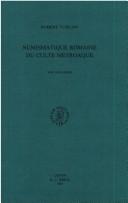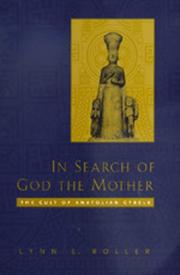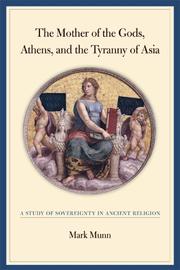| Listing 1 - 6 of 6 |
Sort by
|

ISBN: 9004068430 9004296484 9789004068438 Year: 1983 Volume: 97 Publisher: Leiden Brill
Abstract | Keywords | Export | Availability | Bookmark
 Loading...
Loading...Choose an application
- Reference Manager
- EndNote
- RefWorks (Direct export to RefWorks)
Cybele (Goddess) --- Numismatics, Roman --- Cybèle (Déesse) --- Numismatique romaine --- Cult --- Culte --- -737.4937 --- Cybebe (Goddess) --- Great Mother of the Gods --- Goddesses --- Classical antiquities --- Arts Numismatics Italia Peninsula and adjacent territories --- Numismatics, Roman. --- Cult. --- Cybèle (Déesse) --- 737.4937 --- Cybele --- Cibela --- Cibele --- Cibeles --- Kybēbē --- Kibela --- Kibele --- Kubaba --- Kübelé --- Kubeleya --- Kubileya --- Kuvava --- Kybelē --- Kybelis --- Matar Kubileya --- Matar Kubeleya --- Cybele (Goddess) - Cult

ISBN: 0520919688 0585153736 9780520919686 9780585153735 0520210247 Year: 1999 Publisher: Berkeley, Calif. University of California Press
Abstract | Keywords | Export | Availability | Bookmark
 Loading...
Loading...Choose an application
- Reference Manager
- EndNote
- RefWorks (Direct export to RefWorks)
"This book is the first comprehensive assembly and discussion of the entire extant evidence concerning the worship of this goddess, called Matar Kubileya in Phrygia, Kybele in ancient Greece, and Magna Mater (the Great Mother) in Rome. Lynn E. Roller presents and analyzes literary, historiographic, and archaeological data ranging from the prehistoric record to the early centuries of the Roman Empire. This book will interest classicists, archaeologists, ancient historians, historians of religion and religious ecology, and everyone who has ever been piqued by curiosity about the Great Mother goddess in the ancient Mediterranean world."--Book jacket.
Goddesses --- Goddesses. --- Medea (Greek mythology) in literature --- European Religions - pre-Christian --- Religion --- Philosophy & Religion --- Female gods --- Gods --- Cybele --- Cibela --- Cibele --- Cibeles --- Kybēbē --- Kibela --- Kibele --- Kubaba --- Kübelé --- Kubeleya --- Kubileya --- Kuvava --- Kybelē --- Kybelis --- Matar Kubileya --- Matar Kubeleya --- Cult. --- Mediterranean Region --- Antiquities.
Book
ISBN: 9783903207516 3903207519 Year: 2020 Publisher: Wien Verlag Holzhausen
Abstract | Keywords | Export | Availability | Bookmark
 Loading...
Loading...Choose an application
- Reference Manager
- EndNote
- RefWorks (Direct export to RefWorks)
(Produktform)Hardback --- (Zielgruppe)Fachpublikum/ Wissenschaft --- Meter/Kybele --- ÖAI --- Österreichische Akademie der Wissenschaften --- Kubabat --- Euphrat --- Ägäis --- Sonderschriften --- Band 60 --- Keilschrift --- Phrygien --- Westanatolien --- Internationales Symposion --- (VLB-WN)1550: Hardcover, Softcover / Geschichte --- Goddesses, Greek --- Sacred space --- Relief (Sculpture), Greek --- Cybele --- Cult --- Cibela --- Cibele --- Cibeles --- Kybēbē --- Kibela --- Kibele --- Kubaba --- Kübelé --- Kubeleya --- Kubileya --- Kuvava --- Kybelē --- Kybelis --- Matar Kubileya --- Matar Kubeleya --- Conferences - Meetings

ISBN: 9004072837 9004296557 9789004072831 Year: 1985 Volume: 103 Publisher: Leiden : E.J. Brill,
Abstract | Keywords | Export | Availability | Bookmark
 Loading...
Loading...Choose an application
- Reference Manager
- EndNote
- RefWorks (Direct export to RefWorks)
Attis (God) --- Cybele (Goddess) --- Attis (Divinité) --- Cybèle (Déesse) --- Cult --- Culte --- -Attis (God) --- -292.211 --- Atys (God) --- Gods --- Cybebe (Goddess) --- Great Mother of the Gods --- Goddesses --- Religion Classical Greek and Roman Gods, goddesses, divinities and deities --- Cult. --- Attis (Divinité) --- Cybèle (Déesse) --- 292.211 --- Attis. Eredienst. Geschiedenis. --- Cybèle. Culte. Histoire. --- Attis. Culte. Histoire. --- Cybele. Eredienst. Geschiedenis. --- Attis --- Cybele --- Cibela --- Cibele --- Cibeles --- Kybēbē --- Kibela --- Kibele --- Kubaba --- Kübelé --- Kubeleya --- Kubileya --- Kuvava --- Kybelē --- Kybelis --- Matar Kubileya --- Matar Kubeleya --- Cybele (Goddess) - Cult --- Attis (God) - Cult

ISBN: 9004061096 9004295631 9789004061095 9789004295636 Year: 1980 Volume: 83 Publisher: Leiden Brill
Abstract | Keywords | Export | Availability | Bookmark
 Loading...
Loading...Choose an application
- Reference Manager
- EndNote
- RefWorks (Direct export to RefWorks)
Cybele (Goddess) --- Romans --- Cybèle (Déesse) --- Romains --- Cult --- Culte --- France --- Vienne (France) --- Antiquities, Roman --- Antiquités romaines --- -Romans --- -936.4 --- Ethnology --- Italic peoples --- Latini (Italic people) --- Cybebe (Goddess) --- Great Mother of the Gods --- Goddesses --- History Ancient world Celtic regions and Gaul --- -Antiquities, Roman. --- Cult. --- Cybèle (Déesse) --- Antiquités romaines --- 936.4 --- Vienne, France --- Antiquities, Roman. --- Cybele --- Cibela --- Cibele --- Cibeles --- Kybēbē --- Kibela --- Kibele --- Kubaba --- Kübelé --- Kubeleya --- Kubileya --- Kuvava --- Kybelē --- Kybelis --- Matar Kubileya --- Matar Kubeleya --- Romans - France - Vienne --- Cybele (Goddess) - Cult --- Vienne (France) - Antiquities, Roman

ISBN: 1282357638 9786612357633 0520931580 160129395X 9780520931589 1429402334 9781429402330 9780520243491 0520243498 9781282357631 9781601293954 Year: 2006 Publisher: Berkeley University of California Press
Abstract | Keywords | Export | Availability | Bookmark
 Loading...
Loading...Choose an application
- Reference Manager
- EndNote
- RefWorks (Direct export to RefWorks)
Among maternal deities of the Greek pantheon, the Mother of the Gods was a paradox. She is variously described as a devoted mother, a chaste wife, an impassioned lover, and a virgin daughter; she is said to be both foreign and familiar to the Greeks. In this erudite and absorbing study, Mark Munn examines how the cult of Mother of the Gods came from Phrygia and Lydia, where she was the mother of tyrants, to Athens, where she protected the laws of the Athenian democracy. Analyzing the divergence of Greek and Asiatic culture at the beginning of the classical era, Munn describes how Kybebe, the Lydian goddess who signified fertility and sovereignty, assumed a different aspect to the Greeks when Lydia became part of the Persian empire. Conflict and resolution were played out symbolically, he shows, and the goddess of Lydian tyranny was eventually accepted by the Athenians as the Mother of the Gods, and as a symbol of their own sovereignty. This book elegantly illustrates how ancient divinities were not static types, but rather expressions of cultural systems that responded to historical change. Presenting a new perspective on the context in which the Homeric and Hesiodic epics were composed, Munn traces the transformation of the Asiatic deity who was the goddess of Sacred Marriage among the Assyrians and Babylonians, equivalent to Ishtar. Among the Lydians, she was the bride to tyrants and the mother of tyrants. To the Greeks, she was Aphrodite. An original and compelling consideration of the relations between the Greeks and the dominant powers of western Asia, The Mother of the Gods, Athens, and the Tyranny of Asia is the first thorough examination of the way that religious cult practice and thought influenced political activities during and after the sixth and fifth centuries B.C.
Despotism --- Religion and politics --- Sovereignty --- State sovereignty (International relations) --- International law --- Political science --- Common heritage of mankind (International law) --- International relations --- Self-determination, National --- Politics, Practical --- Politics and religion --- Religion --- Religions --- Absolutism --- Autocracy --- Tyranny --- Authoritarianism --- Dictatorship --- Totalitarianism --- Religious aspects --- History of doctrines. --- History. --- Law and legislation --- Political aspects --- Cybele --- Cibela --- Cibele --- Cibeles --- Kybēbē --- Kibela --- Kibele --- Kubaba --- Kübelé --- Kubeleya --- Kubileya --- Kuvava --- Kybelē --- Kybelis --- Matar Kubileya --- Matar Kubeleya --- Cult --- Cybele (Goddess) --- ancient greece. --- aphrodite. --- asia. --- assyria. --- athens. --- babylon. --- chastity. --- classicism. --- classics. --- democracy. --- divinity. --- empire. --- epic poetry. --- feminine divine. --- femininity. --- gender. --- gods and goddesses. --- greek goddesses. --- greek gods. --- greek pantheon. --- hellenism. --- hesiod. --- hesiodic epics. --- homer. --- homeric epics. --- ishtar. --- lydia. --- maternal. --- maternity. --- mother of the gods. --- motherhood. --- myth. --- mythology. --- nonfiction. --- panteon. --- persian empire. --- philosophy. --- phrygia. --- politics. --- purity. --- religion. --- religious cults. --- sacred marriage. --- sexuality. --- tyranny. --- tyrants. --- war. --- western asia.
| Listing 1 - 6 of 6 |
Sort by
|

 Search
Search Feedback
Feedback About UniCat
About UniCat  Help
Help News
News